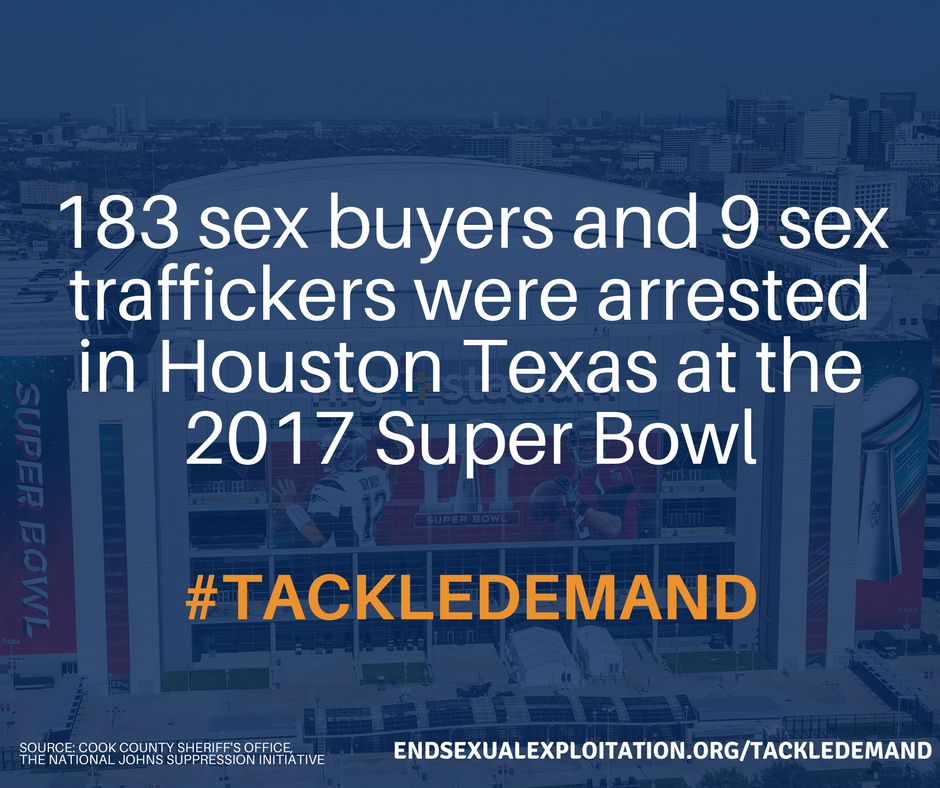The National Center on Sexual Exploitation works with dozens of anti-sexual exploitation groups every year on the #TackleDemand campaign to raise awareness about the need to combat the demand for commercial sex. Why? In part, because the demand for commercial sex fuels sex trafficking.
Every year some people make hyperbolic and false claims that the Super Bowl is the largest sex trafficking event in the country. We are not among them.
But in recent years, another contingent has emerged that claims the exact opposite: that sex trafficking at the Super Bowl is a complete myth.
Interestingly, most of the people making this claim are pro-prostitution (or as they fashionably style it “sex work.”)


The reality is that sex trafficking does occur in connection with Super Bowl, and at most large sporting events, due to increased demand of people (mostly men) looking to buy sex around a celebratory experience.
In 2017, at least 9 sex traffickers and 183 sex buyers were arrested in connection with Super Bowl LI in Houston. In 2015, 360 sex buyers and 68 traffickers were arrested and 30 juvenile victims were recovered. In 2014, 45 arrests were made and 16 juveniles recovered. In 2013 at the New Orleans Super Bowl, 85 arrests made and five victims recovered.
Every year, sex traffickers and buyers are arrested and sex trafficking victims are identified at the Super Bowl.

It’s econ 101!
Enticed by the potential for greater profits, sex traffickers will increase the supply of sexually trafficked persons in areas where there are large sporting events or conventions, particularly if there is a strong demographic of males.
Research from the Arizona School of Social Work entitled “Exploring Sex Trafficking and Prostitution during the Super Bowl 2014” supports this concept. Researchers looked at online ads for prostitution being posted leading up to and during the Super Bowl. The researchers evaluated ads according to a “Sex Trafficking Matrix,” which categorized certain advertisements as “high-risk,” meaning that these ads likely depicted trafficked persons.
The report found that there were distinct victim movements and marketing trends that correspond with the build-up towards the Super Bowl.
The study concluded that “the Super Bowl, or any large event which provides a significant concentration of people in a relatively confined urban area, becomes a desirable location for a trafficker to bring their victims for the purposes of commercial sexual exploitation.”
So why does the pro-prostitution lobby claim there is no connection between sex trafficking and the Super Bowl?
The sex trade is the bedrock on which all sex trafficking exists. Therefore efforts to stop sex trafficking—especially by curbing sex buying behavior—necessarily impact the bottom line of everyone involved in the trade, especially sex traffickers (a.k.a. pimps). In other words, campaigns like #TackleDemand and law enforcement efforts surrounding the Super Bowl disrupt the sex trade’s business model, meaning they make less money. This makes the organized sexual exploitation industry mad, very mad.
Make no mistake, the sex trade is organized and it is founded on sexual exploitation.
Prostitution, whether coerced or not, relies on and fuels the same notions of male sexual entitlement as sex trafficking. It fosters the idea that consent can be bought, and that people are sexual commodities. Share on X
When faced with likely biased motivations, as compared to real life experiences of sex trafficking survivors, law enforcement, and research, it’s clear that our #TackleDemand campaign is on the right track.
You can join in the campaign and speak out against sex trafficking online by tweeting, or retweeting, the below messages:
Without demand for prostitution, there would be no #sextrafficking.
Let’s work together to #enddemand for sex trafficking at Super Bowl 52!
Sign up for our #SB52 #TackleDemand Thunderclap NOW! → → https://t.co/9vCX6hVxo9 pic.twitter.com/zAFfAVgUvF
— NCOSE (@ncose) January 31, 2018
Real sports fans don’t buy sex. #TackleDemand for sex trafficking at #SB52. https://t.co/a6eEhCMQJK via @ncose
— WorldWE (@WorldWEUS) January 29, 2018
If men stopped buying sex, sex trafficking would stop. #TackleDemand Share on XDo you care about fighting sex trafficking? Then raise your voice during #SB52! Join our online “virtual flashmob” and pledge a Tweet to help #TackleDemand for sex trafficking: https://t.co/7YeoBKi2gA
— Demand Abolition (@DemandAbolition) January 25, 2018


